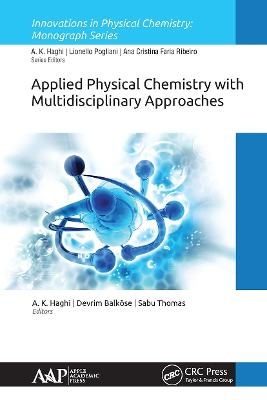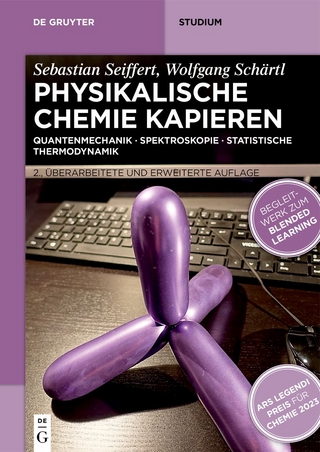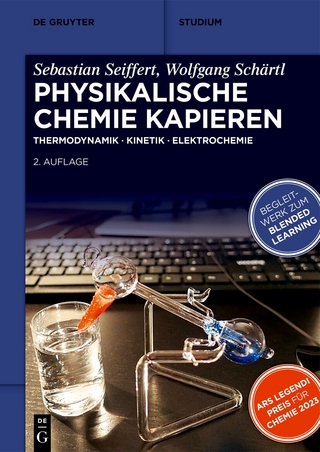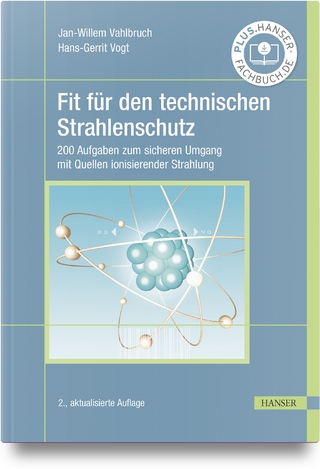
Applied Physical Chemistry with Multidisciplinary Approaches
Apple Academic Press Inc. (Verlag)
978-1-77463-638-1 (ISBN)
This new volume presents an up-to-date review of modern materials and chemistry concepts, issues, and recent advances in the field. Distinguished scientists and engineers from key institutions worldwide have contributed chapters that provide a deep analysis of their particular subjects. At the same time, each topic is framed within the context of a broader more multidisciplinary approach, demonstrating its relationship and interconnectedness to other areas. The premise of this book, therefore, is to offer both a comprehensive understanding of applied science and engineering as a whole and a thorough knowledge of individual subjects. This approach appropriately conveys the basic fundamentals, state-of-the-art technology, and applications of the involved disciplines, and further encourages scientific collaboration among researchers.
This volume emphasizes the intersection of chemistry, math, physics, and the resulting applications across many disciplines of science and explores applied physical chemistry principles in specific areas, including the life chemistry, environmental sciences, geosciences, and materials sciences. The applications from these multidisciplinary fields illustrate methods that can be used to model physical processes, design new products and find solutions to challenging problems.
A. K. Haghi, PhD, is the author and editor of 165 books, as well as 1000 published papers in various journals and conference proceedings. Dr. Haghi has received several grants, consulted for a number of major corporations, and is a frequent speaker to national and international audiences. Since 1983, he served as professor at several universities. He is currently Editor-in-Chief of the International Journal of Chemoinformatics and Chemical Engineering and Polymers Research Journal and on the editorial boards of many international journals. He is also a member of the Canadian Research and Development Center of Sciences and Cultures (CRDCSC), Montreal, Quebec, Canada. He holds a BSc in urban and environmental engineering from the University of North Carolina (USA), an MSc in mechanical engineering from North Carolina A&T State University (USA), a DEA in applied mechanics, acoustics and materials from the Université de Technologie de Compiègne (France), and a PhD in engineering sciences from Université de Franche-Comté (France). Devrim Balköse, PhD, is currently a retired faculty member in the Chemical Engineering Department at Izmir Institute of Technology, Izmir, Turkey. She graduated from the Middle East Technical University in Ankara, Turkey, with a degree in chemical engineering. She received her MS and PhD degrees from Ege University, Izmir, Turkey, in 1974 and 1977 respectively. She became Associate Professor in macromolecular chemistry in 1983 and Professor in process and reactor engineering in 1990. She worked as research assistant, assistant professor, associate professor, and professor between 1970–2000 at Ege University. She was the Head of Chemical Engineering Department at Izmir Institute of Technology, Izmir, Turkey, between 2000 and 2009. Her research interests are in polymer reaction engineering, polymer foams and films, adsorbent development, and moisture sorption. Her research projects are on nanosized zinc borate production, ZnO polymer composites, zinc borate lubricants, antistatic additives, and metal soaps. Sabu Thomas, PhD, is a Professor of Polymer Science and Engineering at the School of Chemical Sciences and Director of the International and Inter University Centre for Nanoscience and Nanotechnology at Mahatma Gandhi University, Kottayam, Kerala, India. The research activities of Professor Thomas include surfaces and interfaces in multiphase polymer blend and composite systems; phase separation in polymer blends; compatibilization of immiscible polymer blends; thermoplastic elastomers; phase transitions in polymers; nanostructured polymer blends; macro-, micro- and nanocomposites; polymer rheology; recycling; reactive extrusion; processing–morphology–property relationships in multiphase polymer systems; double networking of elastomers; natural fibers and green composites; rubber vulcanization; interpenetrating polymer networks; diffusion and transport; and polymer scaffolds for tissue engineering. He has supervised 68 PhD theses, 40 MPhil theses, and 45 Masters thesis. He has three patents to his credit. He also received the coveted Sukumar Maithy Award for the best polymer researcher in the country for the year 2008. Very recently, Professor Thomas received the MRSI and CRSI medals for his excellent work. With over 600 publications to his credit and over 23683 citations, with an h-index of 75, Dr. Thomas has been ranked fifth in India as one of the most productive scientists.
Smart Polymers: A Smart Approach to Life. An Assessment on Polymer Electrolyte Membrane (PEM) Fuel Cell Stack Components. Theoretical Studies on Molecular Designing of Novel Electrically Conducting Polymers Using Genetic Algorithm. Spectral Tuning of P3HT/PTCDA Bulk Hetero P-N Junction Blend for Plastic Solar Cell. Design Strategies of Polymer for High-Performance Organic Photovoltaics. An Overview on Li-S Battery and Its Opportunities to Challenges. Density Clustering for Automatic Lesion Detection in Diabetic Retinopathy from Eye Background Images. Reflections on Artemisinin, Proposed Molecular Mechanism of Bioactivity and Resistance. Classification of Citrus: Principal Components, Cluster and Meta Analyses. Biodiversity and Conservation. Advanced Oxidation Processes, Industrial Wastewater Treatment and Innovations of Environmental Chemistry: A Vision for the Future. Nickel Stearate Hydrosols for Hydrophobic Cellulose. Nano Zinc Borate as a Lubricant Additive. Diffusion of Copper Nitrate in Aqueous Solutions at 298.15 K. A Critical Overview of Application of Evolutionary Computation in Designing Petroleum Refining Units: A Vision for the Future. Mathematical Model of Centrifugal Sedimentation of Corpuscles in a Cyclonic Deduster. Macromolecules Visualization Through Bioinformatics: An Emerging Tools of Informatics. Informatics Approach and Its Impact for Bioscience: Making Sense of Innovation.
| Erscheinungsdatum | 06.04.2021 |
|---|---|
| Reihe/Serie | Innovations in Physical Chemistry |
| Zusatzinfo | 30 Tables, black and white; 12 Illustrations, color; 107 Illustrations, black and white |
| Verlagsort | Oakville |
| Sprache | englisch |
| Maße | 156 x 234 mm |
| Gewicht | 453 g |
| Themenwelt | Naturwissenschaften ► Biologie |
| Naturwissenschaften ► Chemie ► Physikalische Chemie | |
| Technik ► Maschinenbau | |
| ISBN-10 | 1-77463-638-7 / 1774636387 |
| ISBN-13 | 978-1-77463-638-1 / 9781774636381 |
| Zustand | Neuware |
| Informationen gemäß Produktsicherheitsverordnung (GPSR) | |
| Haben Sie eine Frage zum Produkt? |
aus dem Bereich


